Pork belly and bacon are both delectable parts of pork and used in so many recipes, but how are they different? Knowing their characteristics can be of great help when cooking, regardless if you’re trying to substitute one for the other or adding extra flavor to a recipe.
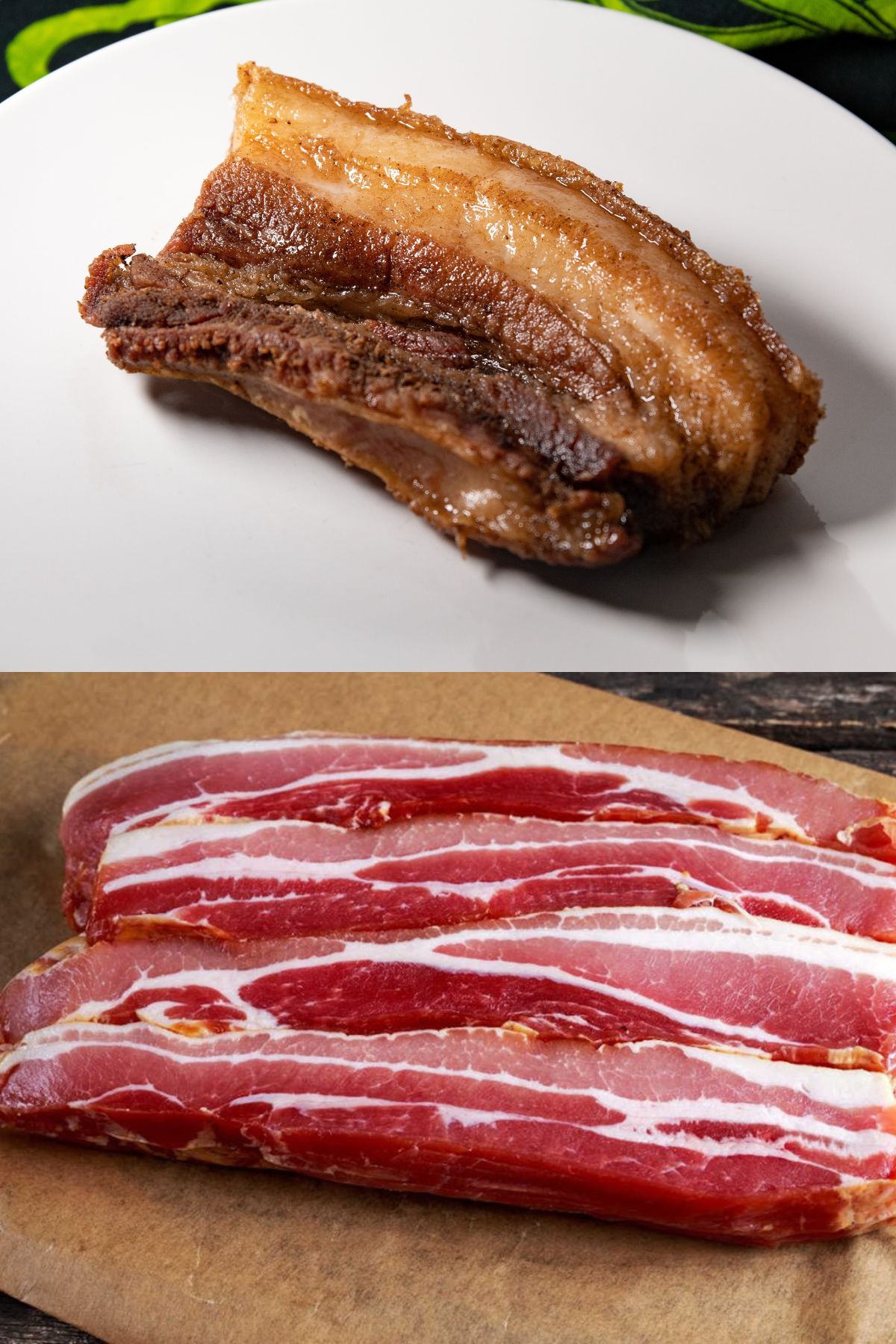
Bacon is most of the time derived from pork belly, although it can come from other animals such as lamb, turkey, and chicken.
Pork belly has a straightforward name and yes, it always comes from pork.
Are you feeling confused? Keep reading to find out their unique attributes and the qualities they provide for cooking so you can always choose the right one for your needs!
What Is Pork Belly?
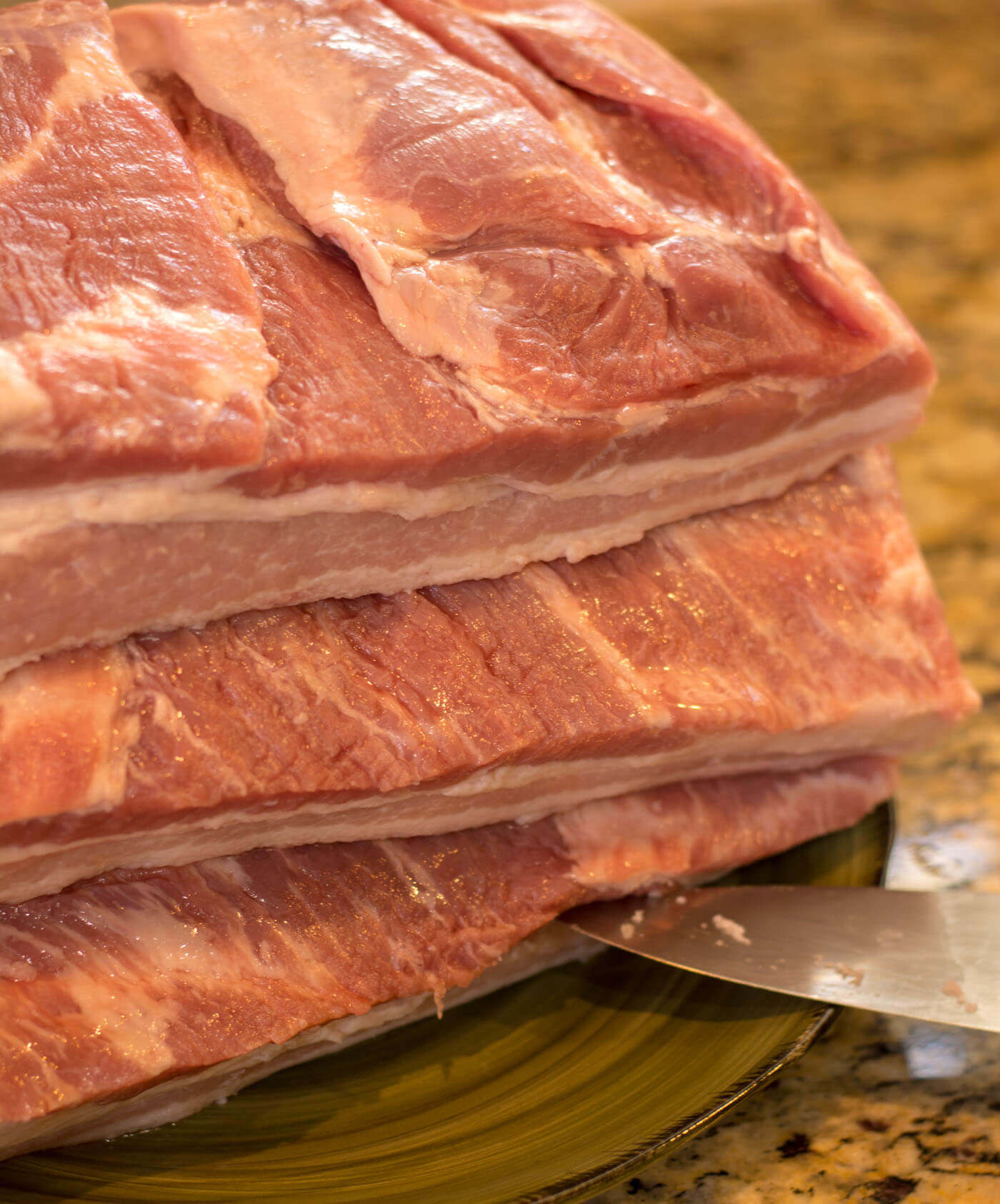
Pork belly is a brick-shaped cut of meat that comes from the underside of the pig. It has layers of meat and fat, as well as some marbling, making it as tasty as calorie-dense.
Braising is one of the most popular techniques used for cooking pork belly, as Chinese cuisine shows. It also turns out delicious when deep-fried, grilled, or roasted.
You can find it for sale cut in inch-thick strips or as large slabs. It’s used in various recipes, along with veggies and pasta.
Pork belly is undeniably a super-fatty cut of pork, but you don’t need to worry about it containing dangerous preservatives or other chemicals as it’s uncured.
What Is Bacon?
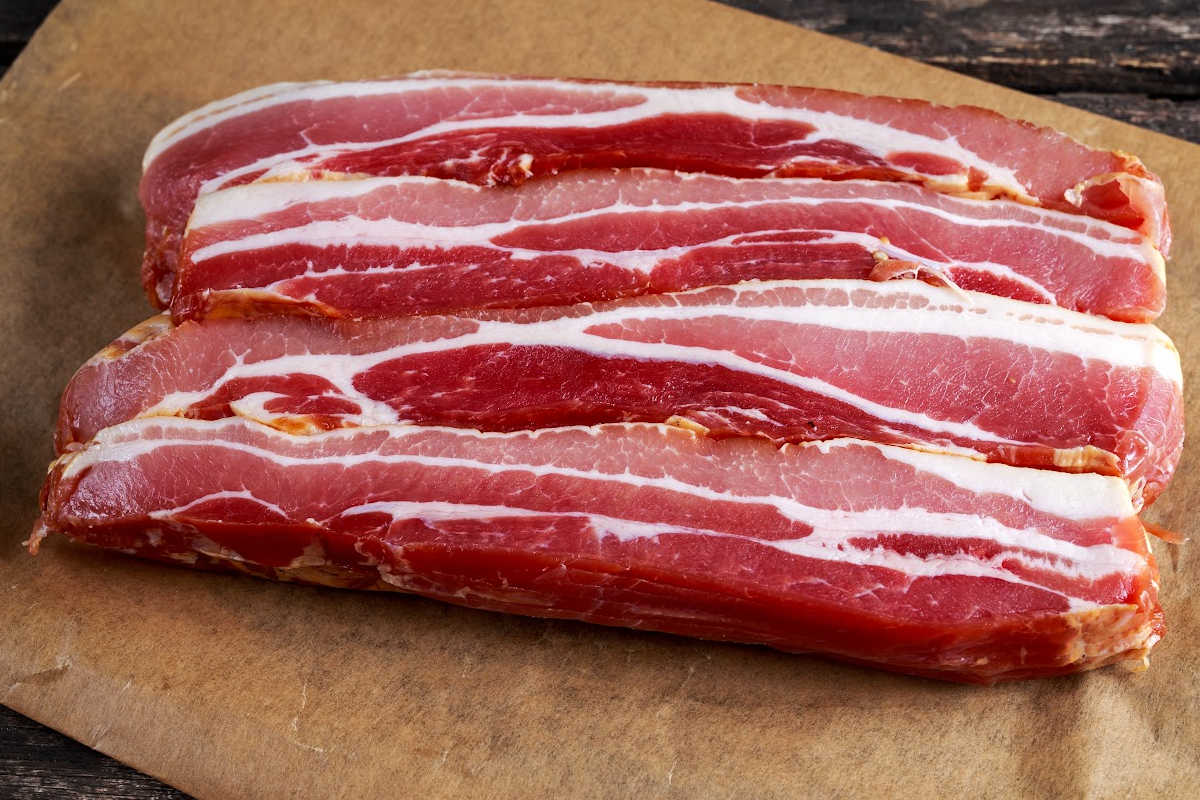
In most cases, bacon comes from pork belly that was cured, smoked, and cut into thin slices. Hickory and applewood are the most commonly used types of wood for smoking bacon.
It can come from other parts of the pig or even from other animals. If such is the case, you should have this information on the label.
The curing process takes about 5-7 days for pork belly bacon. Then, it is dried up to one day and finally goes through the smoking process.
Despite the curing, bacon still needs to be cooked before eating for safety purposes.
The fat that remains after cooking bacon is called lard. It has a great flavor, and it’s used in various recipes, even salad dressings and sauces.
🥓Types Of Bacon
| Type Of Bacon | Alternate Names | Processing Methods | Composition | Uses |
|---|---|---|---|---|
| Streaky Bacon | Side bacon, American bacon, Belly bacon | Cured and smoked | Rich in fat | Eggs, salads, burgers, sandwiches |
| English Bacon | Rasher | Cured but not smoked | Lower fat content | Classic British breakfast |
| Canadian Bacon | Back bacon, Rashers | Not always smoked | Extremely meaty, very low fat | Protein-rich meals |
| Cottage Bacon | – | Cured and smoked | Leaner, more ham flavor | Cooked like regular bacon |
| Speck | – | Cured, cold smoked | Lean, unique spice mix | Pasta, consumed as is |
| Irish Bacon | – | Cured, not smoked | Higher fat than Canadian bacon | Sandwiches, burgers, pasta, omelets |
| Pancetta | – | Cured but not smoked | Salty, similar to American bacon | Pasta carbonara, silky texture |
| Slab Bacon | – | Smoked, cured, and/or aged | Variety of flavors and textures | Same as sliced or cubed bacon |
| Lardon | – | Typically unsmoked | Small cubes, rich in salt | Soups, stews, pasta, pizza topping |
| Jowl Bacon | Hog jowl | Curing and smoking | From pig’s cheek area | Fried, breakfast, sandwich, veggie side dish |
| Non-pork Bacon | Beef, turkey, salmon, lamb, plant-based | Varies | Different flavor and texture | Sandwiches, diverse uses |
Not all bacon is created equal, although all types have their own appeal and I encourage you to try them all!
Here are the essential bacon varieties you need to know about:
Streaky Bacon
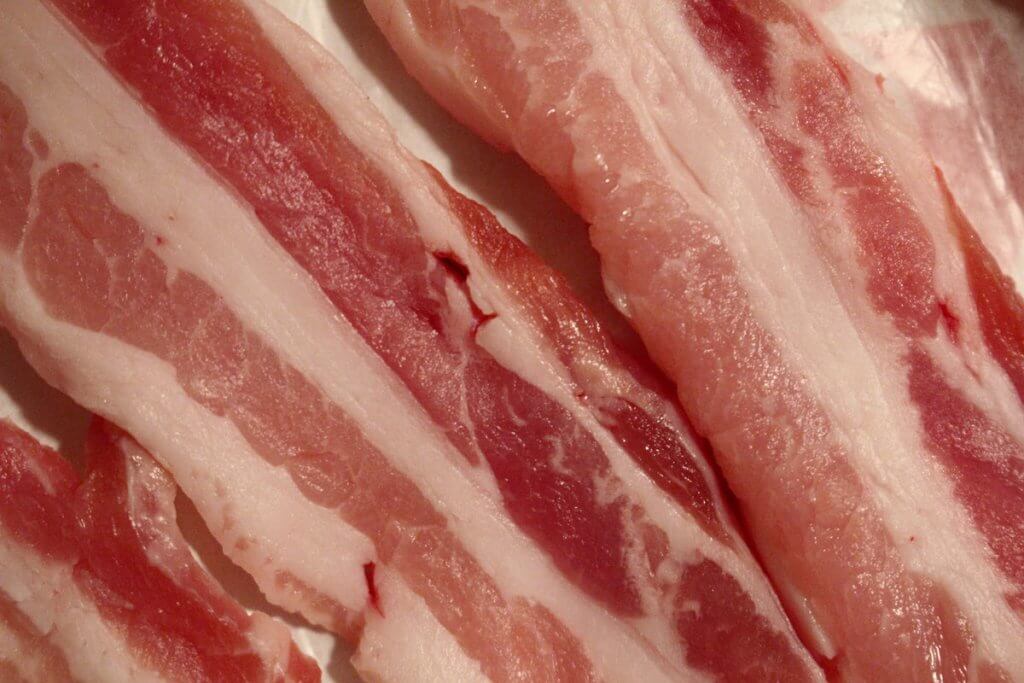
Also known as side bacon, American bacon, or belly bacon, this type of bacon is rich in fat and is typically cured and smoked.
The thinly sliced variation can become incredibly crispy when cooked. The crunchy texture goes well alongside eggs, in salads, burgers, sandwiches, and many other dishes.
For thin slices, it’s easy to over or undercook bacon and that can ruin its texture or even pose a health risk. It’s pretty easy to tell when bacon is done and it can be done regardless if you like it crispy or slightly chewy.
English Bacon
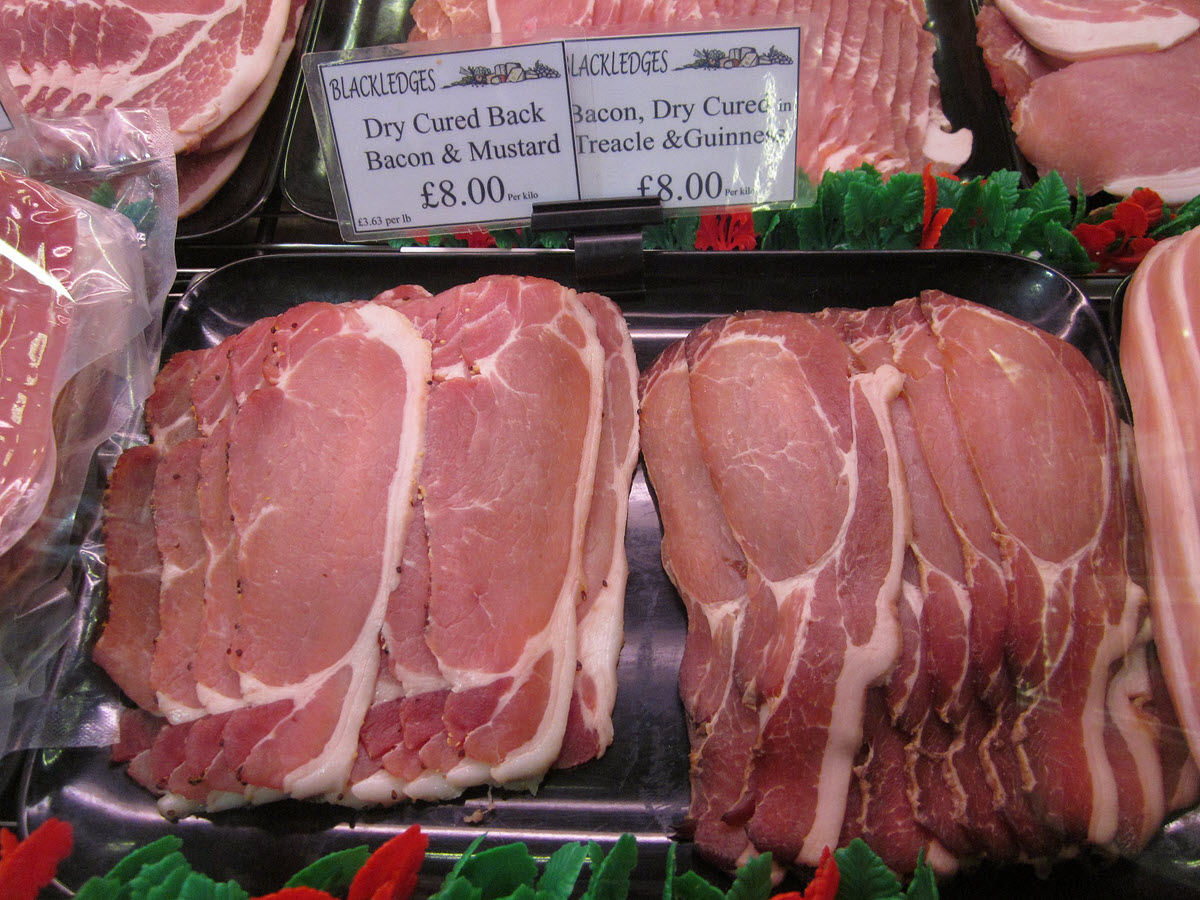
If there’s no English bacon, it’s not a classic British breakfast. Unlike the American counterpart, this bacon comes from the loin area and has a significantly lower fat content.
English bacon is cured but not smoked and the British call it rasher.
Canadian Bacon
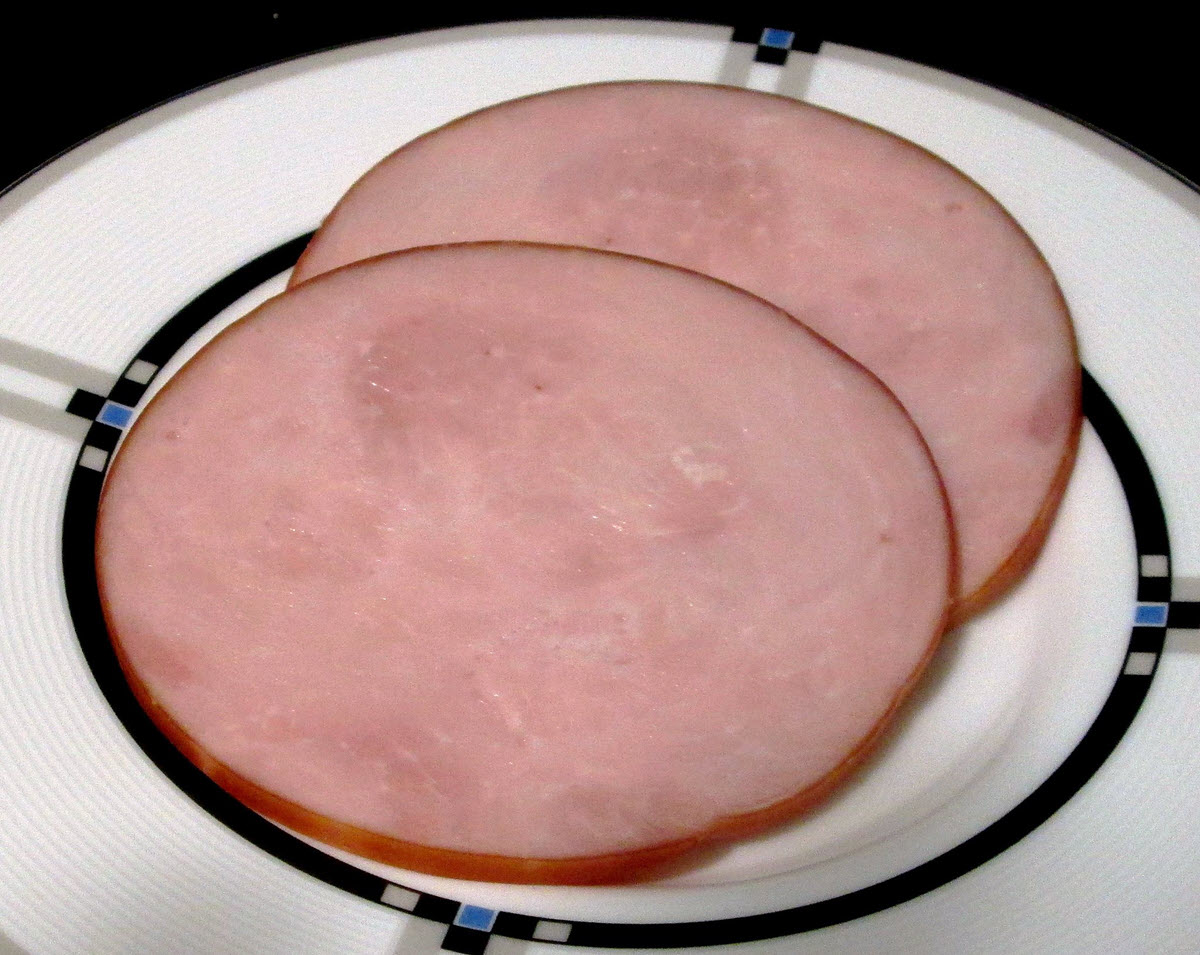
Also called back bacon or rashers, it is served as oval slices, Canadian bacon is extremely meaty and usually comes from the back of the swine.
It’s not always smoked and has a very low fat content compared to pork belly. It’s perfect if you are trying to add extra protein to your meals.
Cottage Bacon
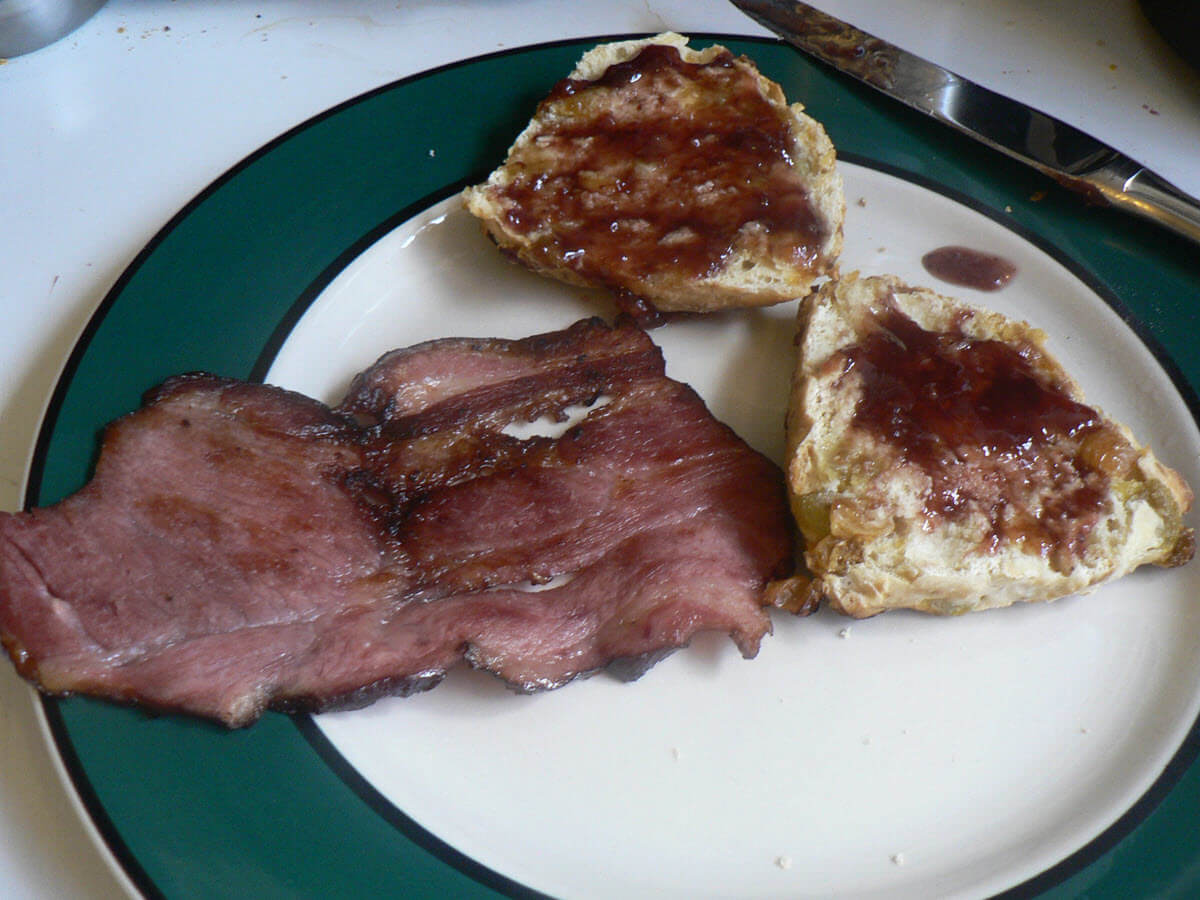
This is a leaner type of bacon made from pork shoulder, not pork belly. It is typically cured and smoked and the resulting taste has a more pronounced ham flavor compared to traditional bacon.
You can cook cottage bacon the same way you would regular bacon although keep in mind it is leaner so it will cook a little faster.
Speck
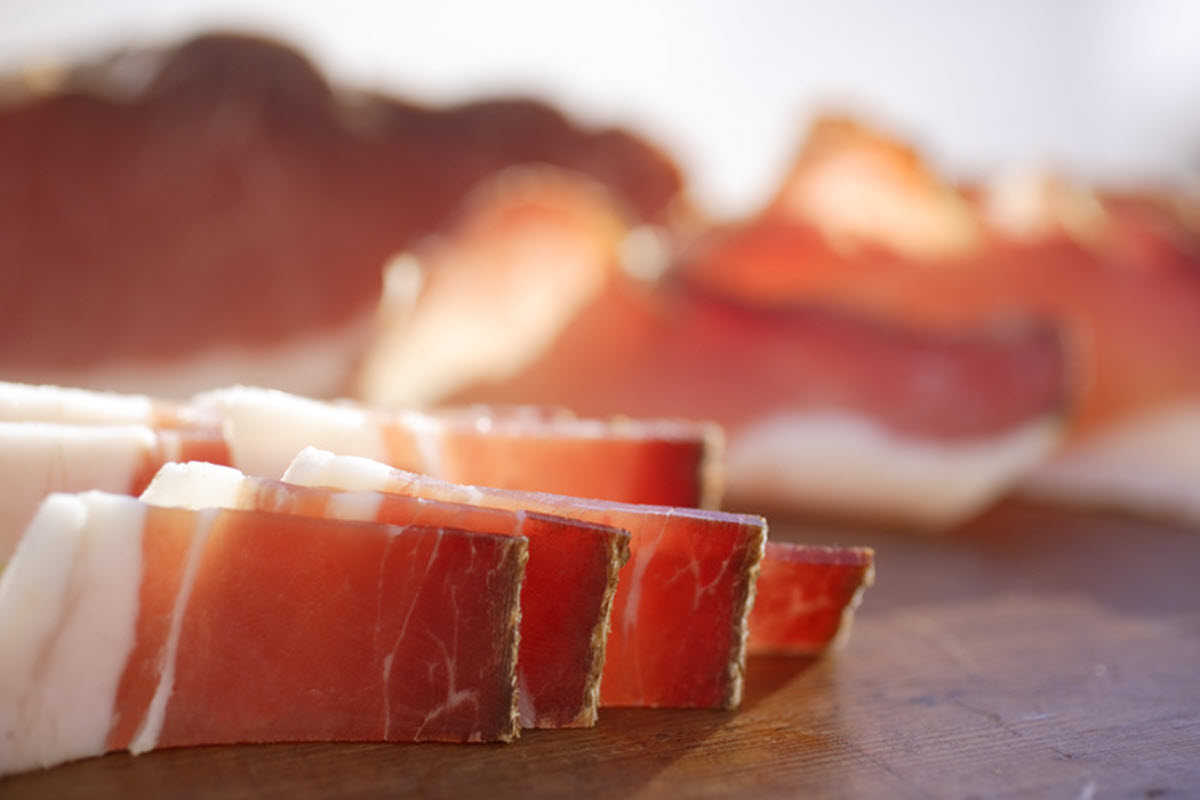
Made from lean pork legs which is the same cut used for ham, speck is cured using a unique mix of spices. This blend usually includes pepper, rosemary, bay leaf, juniper berries, and cumin, among others.
It’s cured in cold rooms for up to three weeks and goes through several light cold smoking sessions.
This Italian delicacy has origins in the Tyrol area and after smoking, it’s further cured for about 22 weeks.
Speck is used in many recipes, including pasta, but its intense flavor is best appreciated when consumed as is, alongside wine, cheese, and pickles.
Irish Bacon
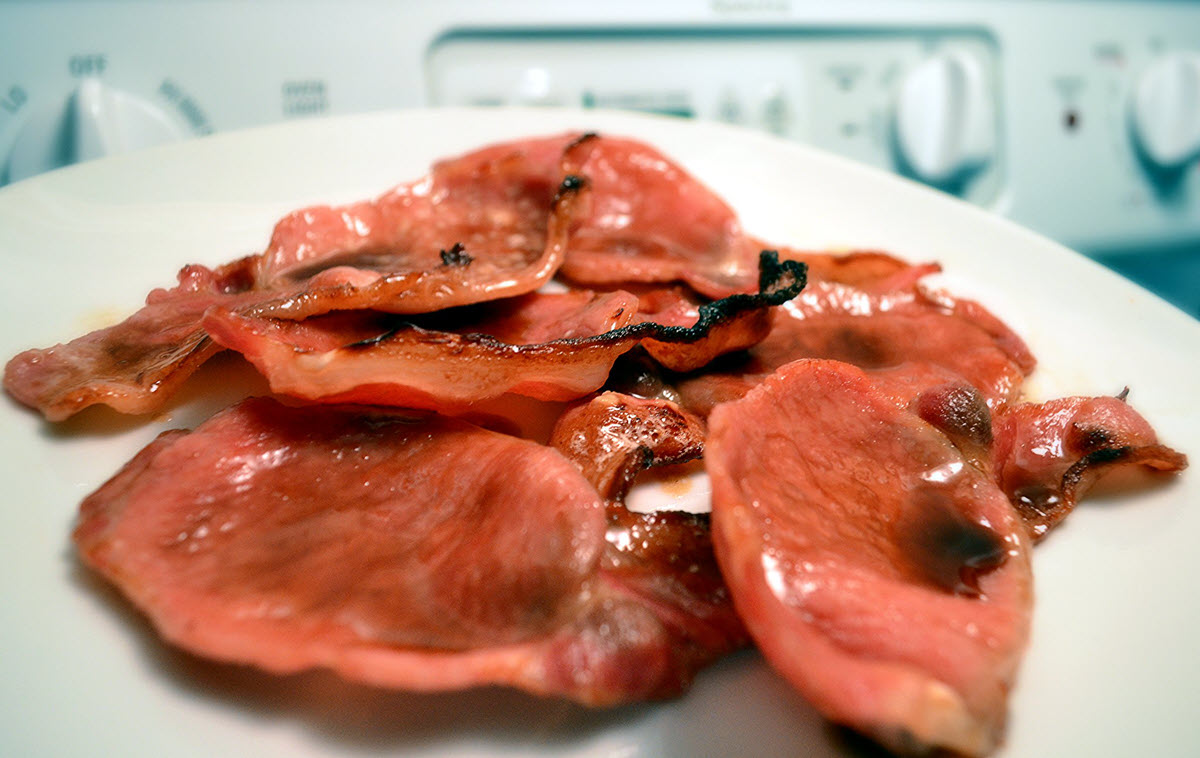
Made from the back of the pig, cured, and not smoked, Irish bacon shares some similarities with Canadian and English bacon.
Served as circular slices it has a higher fat content than the Canadian counterpart.
Unlike Americans, the Irish rarely fry their bacon. For the exceptions, it’s cooked only until done, and not to a crisp.
Other than that, you can use it the same as streaky bacon in a variety of recipes such as sandwiches, burgers, pasta, omelets, salads, for breakfast, or even lunch.
Pancetta
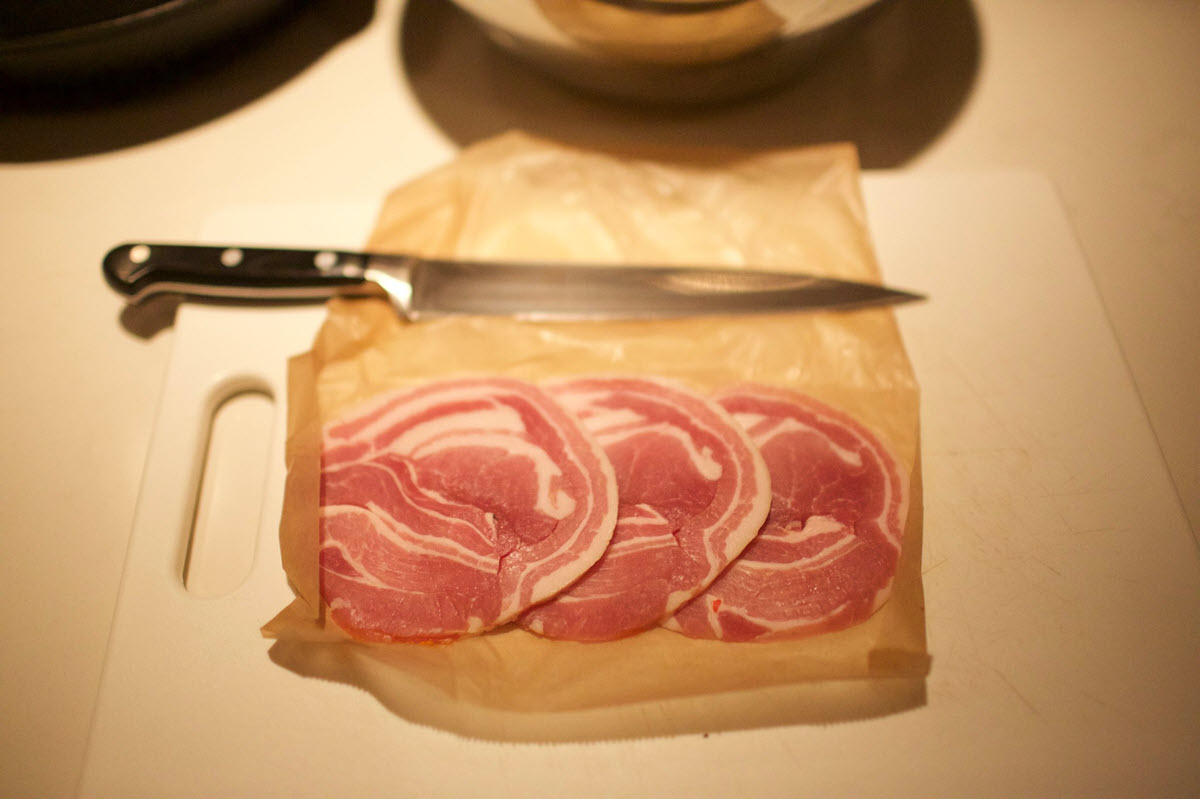
This Italian specialty bacon is cured but not smoked and can be served both raw and cooked.
You will find it for sale as slices or cubes and it has a salty taste similar to the American bacon but without the smokiness.
They make pancetta from pork belly and the curing process takes about three weeks.
It’s a key ingredient in pasta carbonara and thanks to the high fat content, it has a very silky texture.
Slab Bacon
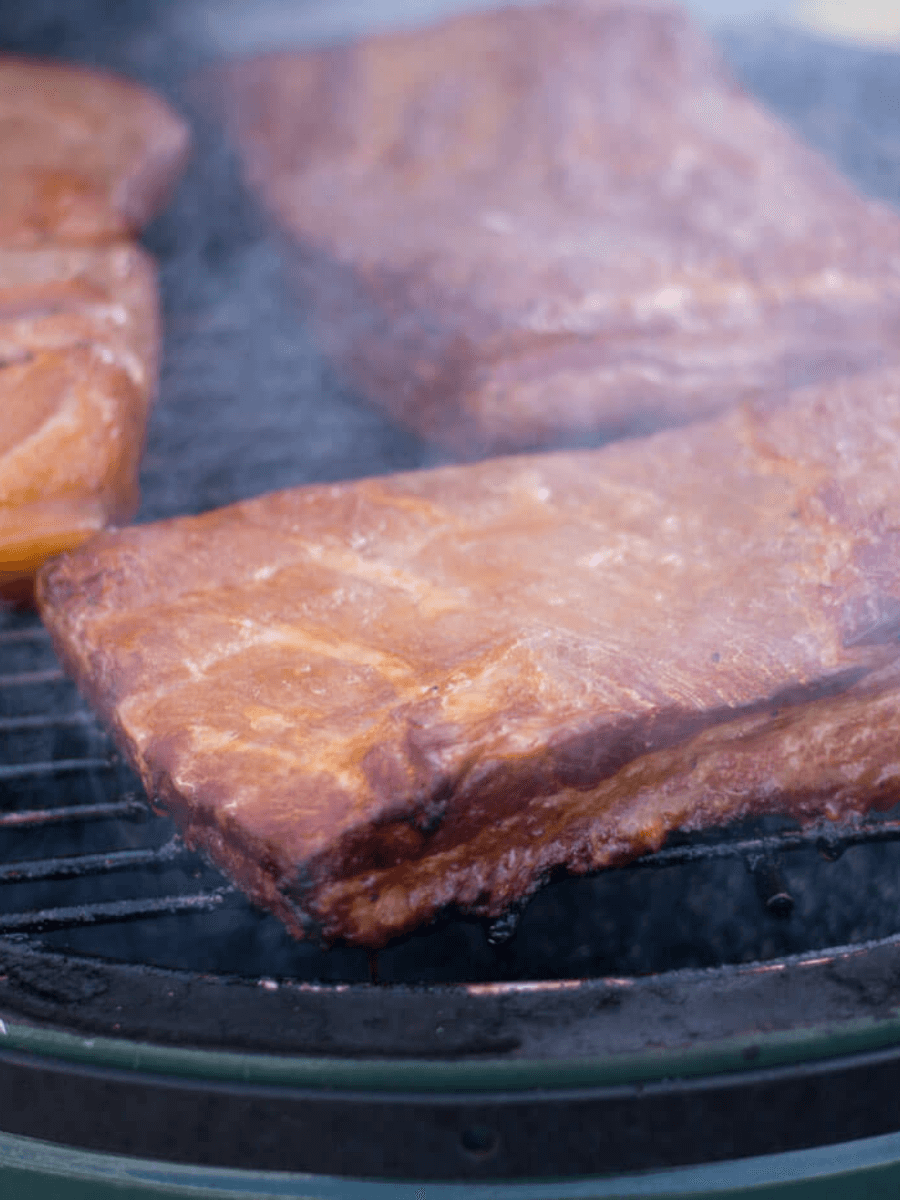
Whole smoked pork belly is what we know as slab bacon and it is typically made from the less expensive side cuts. You get the benefit of slicing it as thin as needed, but you can also cut it into cubes.
There’s no particular way of making slab bacon so it can be a combination of smoking, curing, and/or aging.
This means you can find a variety of flavors and textures so there’s lots of room for experimenting.
If you have a smoker, you can even make homemade slab bacon and experiment with different spices and flavors when curing it.
Lardon
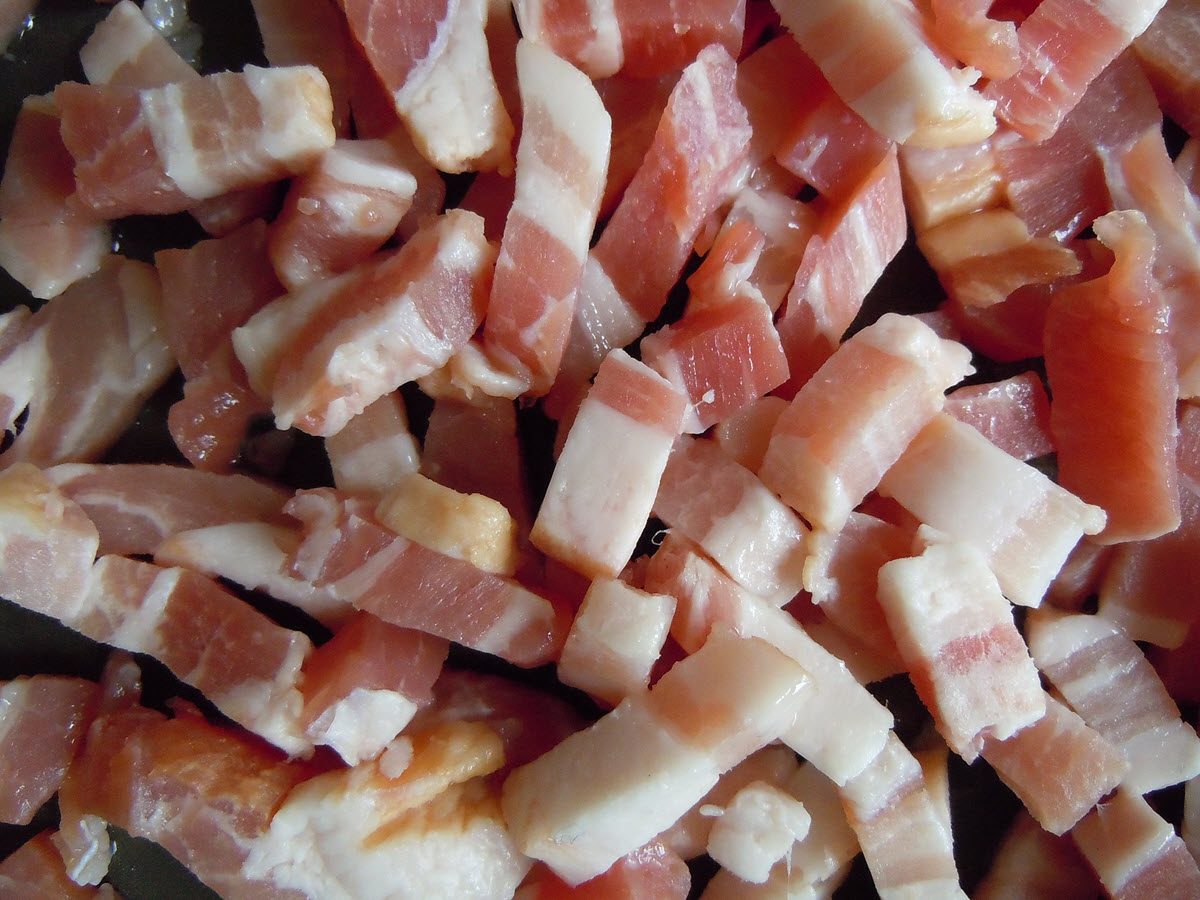
This is a variety of bacon that comes from French cuisine. Lardons are small cubes of bacon, typically unsmoked and rich in salt.
You’ll find them in various French recipes such as Quiche Lorraine and coq au vin, but they are also fantastic in soups, stews, pasta, and even as a pizza topping!
Grocery stores usually sell these fatty cubes in vacuum packs. If you can’t find any, just purchase some slab bacon and cut it into 1/4-inch pieces.
Jowl Bacon
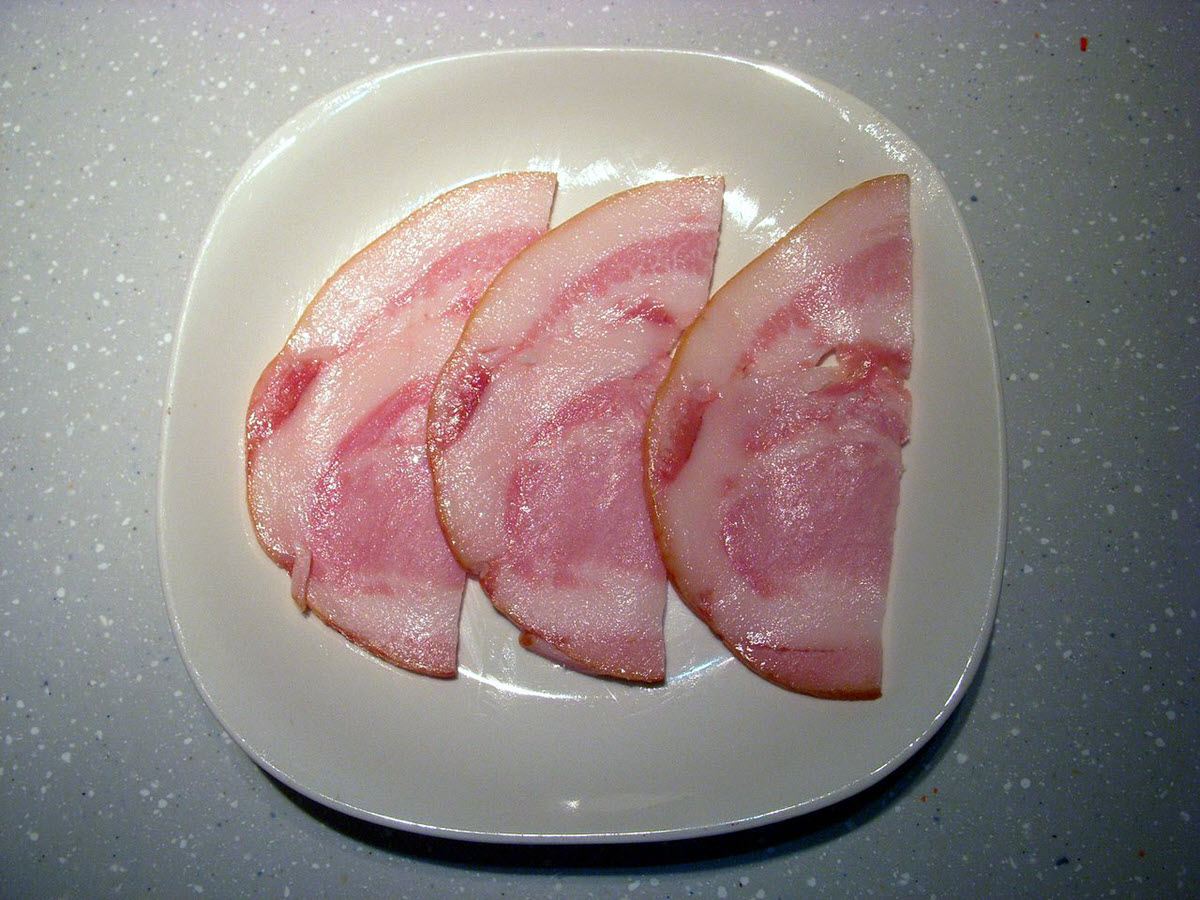
The cheek area of the pig gives us the tasty jowl bacon, also called “hog jowl” by Southerners.
Like streaky bacon, jowl bacon also goes through a curing and smoking process. It’s great when fried, served for breakfast, in a sandwich, or with a veggie-based side dish.
Non-pork Bacon
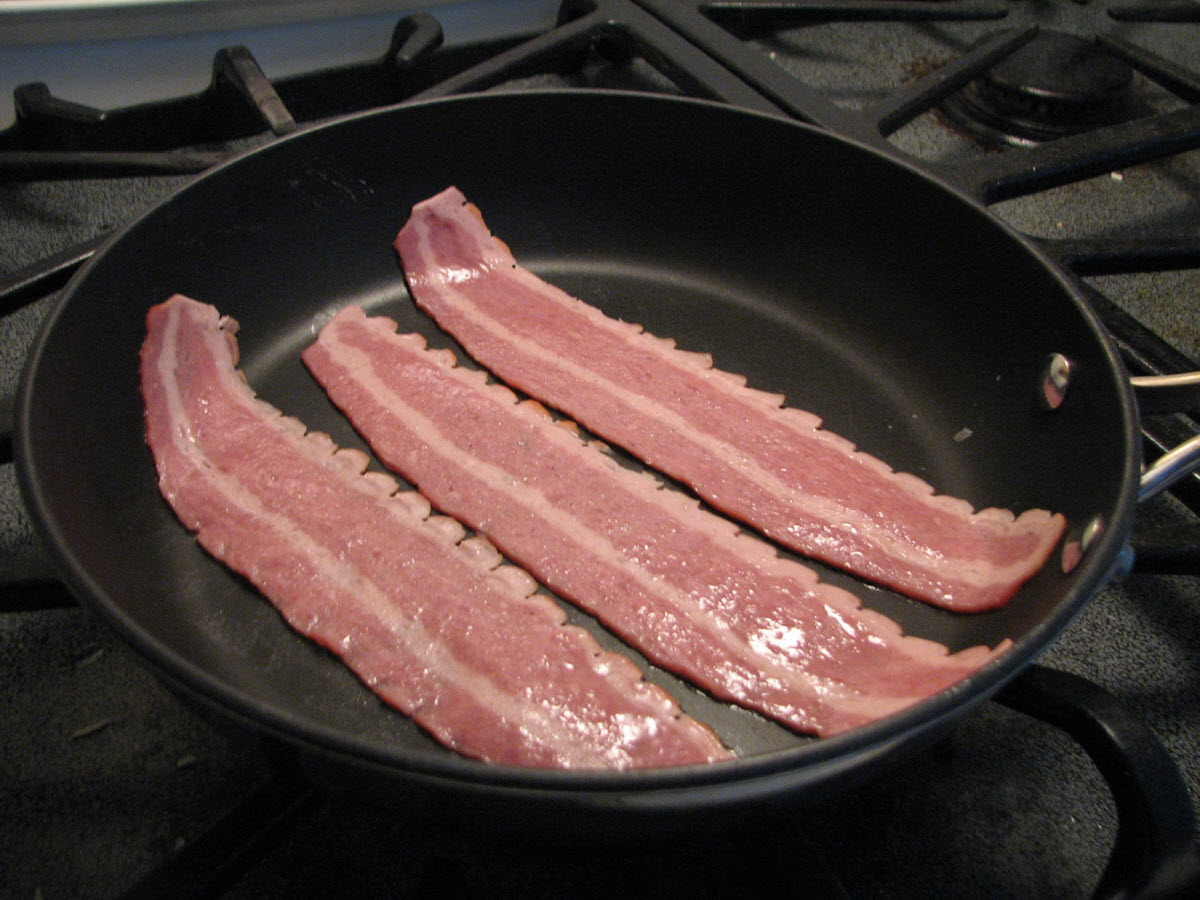
Yes, there are some types of bacon that come from other animals. Appearance-wise beef bacon seems to be closest to the real thing.
In reality, the flavor resembles steak rather than traditional pork bacon, but it still makes an excellent choice for sandwiches.
You may also find duck, turkey, salmon, lamb, and even plant-based bacon.
Despite the marketing, expect non-pork bacon varieties to have a completely different flavor and texture compared to the original.
🆚Pork Belly vs Bacon – Main Differences
| Aspect | Pork Belly | Bacon |
|---|---|---|
| Processing | Sold raw, less processing time, no curing or smoking. | Mostly cured with salt and nitrates, often smoked. More processing time. |
| Flavor | More natural pork flavor – requires added spices for enhancement. | Salty, smoky flavor, influenced by the curing process and spices used. |
| Price | Generally less expensive due to less processing. | More expensive due to longer processing times and additives. |
| Uses | Can be used in a variety of cooking methods; suitable as a main dish. | Commonly used in thin slices or cubes; ideal for frying, and as an addition to dishes. |
| Nutrition | Higher in fat. | Higher in protein and salt. |
| Health Benefits | Sold raw and uncured, without harmful additives. | High in salt and often contains additives; should be consumed in moderation. |
Now that we discussed some of the most popular types of bacon, you already know it usually comes from pork belly, but not always.
Of course, there are other differences between pork belly and bacon, so here are the most important ones:
Curing And Smoking
Most of the time, bacon is cured, which basically means it’s preserved with salt and nitrates.
The curing process takes time and eliminates some of the water raw meat contains.
Various kinds of bacon are enhanced with a mix of spices which adds up to their cost.
We have bacon varieties that are also smoked, further increasing the processing time needed for the finished product.
Pork belly is sold raw, so it takes a lot less time to make it which is also reflected in its price.
Flavor
Curing and smoking give bacon a completely different flavor compared to pork belly.
Cured bacon will taste salty, and if such is the case, it will also have a smoky flavor.
Other factors that impact flavor are the spices, the cut of the pig used, and the meat-to-fat ratio.
Price
Bacon requires longer processing times and various additives which means it will always be more expensive than pork belly.
Uses
Bacon usually comes in thin slices or small cubes, and both types are suitable for frying to a crisp. Its crispiness makes a wonderful addition to burgers, sandwiches, soups, and salads.
Pork belly can be prepared using various cooking methods such as slow cooking, oven roasting, braising, and even smoking.
It has a softer texture compared to bacon and you can add it to various dishes but also as a meat entrée.
Nutrition
| Nutrient | Raw Pork Belly (per 100g) | Raw Cured Bacon (per 100g) |
|---|---|---|
| Calories | 518 kcal | 393 kcal |
| Protein | 9.34 g | 13.7 g |
| Total Fat | 53 g | 37.1 g |
| Carbohydrates | 0 g | 0 g |
| Sodium | 32 mg | 751 mg |
| Iron | 0.52 mg | 0.38 mg |
| Magnesium | 4 mg | 13 mg |
| Phosphorus | 108 mg | 166 mg |
| Potassium | 185 mg | 201 mg |
| Calcium | 5 mg | 6 mg |
Pork belly is the fattier option of the two although keep in mind the nutritional information above is for the raw, unprepared meat. This means once you cook your pork belly or bacon a lot of the fat will render so you won’t ingest as much.
Because of the curing process, bacon has significantly more salt than pork belly. Bacon also has less water than pork belly so it is a little more concentrated in nutrients such as magnesium, phosphorus, and potassium.
The nutritional profile of your recipe can change these numbers as they don’t include any added sugars, sauces, or condiments.
Health Benefits
Bacon sure tastes good, although it should be consumed occasionally and sparingly. You can balance its high salt content by reducing the salt in your recipe or accompanying side dish.
Bacon often has other additives to enhance flavor and those are usually not healthy.
Pork belly is sold raw and uncured, which means you are the one responsible for adding flavors and it doesn’t contain any harmful additives.
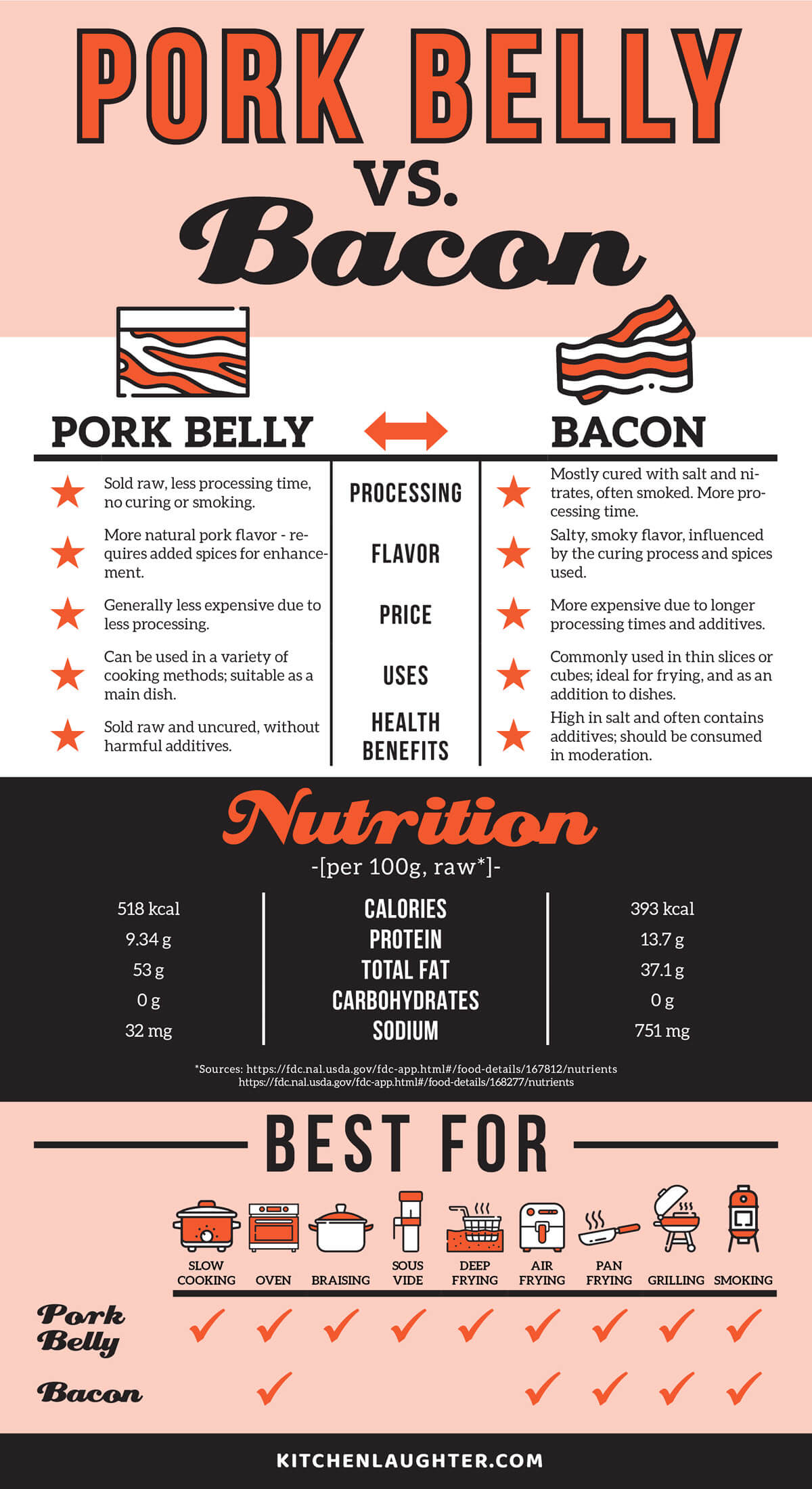
Can You Use Pork Belly Instead Of Bacon?
Many recipes will allow you to substitute pork belly for bacon. You can even cut pork belly into thin slices and fry it to get a crispy texture.
The salt content is one key difference and if you use pork belly instead of bacon, you might need to add more salt to your recipe.
Also, keep in mind pork belly will require a longer cooking time compared to bacon.
Can’t find pork belly at the grocery store? Try one of these excellent pork belly substitutes!
When To Use Pork Belly vs. Bacon?
Not much effort is needed to make bacon taste great. You can just fry it, and eat it next to some eggs, put it on top of a sandwich, or crumble it into a soup.
Best Ways To Cook Bacon | I find bacon most enjoyable when it’s at least slightly crispy.
There are several cooking methods you can use for this and they work for both cubed or sliced bacon: pan frying, roasting, grilling, and air frying.
Bacon As A Wrapping | Another thing bacon is great for is wrapping.
You can use it to wrap veggies and lean meat for roasting and grilling to keep them moist while the outside becomes incredibly crispy.
Candied Bacon | It even works as a salty-sweet treat such as candied or chocolate-covered bacon.
Best Ways To Cook Pork Belly | Pork belly is quite versatile and used in many cuisines around the world since it can be cooked using various methods.
Slow cooking, roasting, braising, grilling, pan frying, sous vide, air frying, smoking, or even deep frying work great for pork belly.
It’s a staple in Asian noodle dishes such as ramen and makes a wonderful addition to stews.
🔥Bacon Recipe Ideas
I realize this is not something everyone can or wants to do, but it is worth mentioning you can make your own bacon from pork belly.
Homemade Bacon Recipe
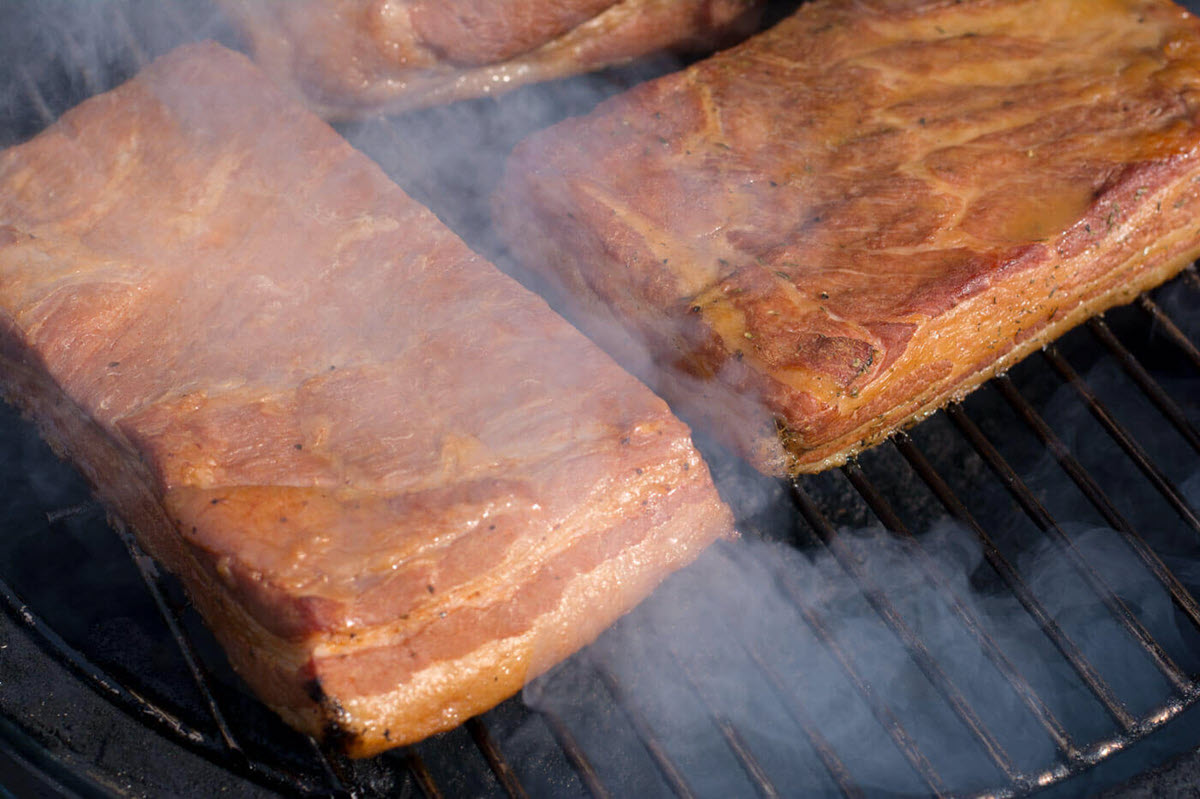
If you have a smoker, smoking wood chips or chunks, and some raw pork belly you’re good to go. We used pink curing salt to cure the pork belly for our homemade smoked bacon and allowed the whole slabs to sit in the fridge for a week.
Then, we rinsed the slabs thoroughly to wash off the excess salt and herbs and allowed them to sit uncovered in the fridge for about 4 hours. This will dehydrate the exterior a little and allow a pellicle to form which will help the smoke better stick to the meat.
We had 3 slabs of bacon, each with a different homemade seasoning blend, and they were all smoked low and slow at 250°F until their internal temperature reached 150°F. For us, this took about 3 and a half hours.
One thing I can say for sure is homemade bacon is not difficult to make and it tastes divine!
Recipes Using Bacon
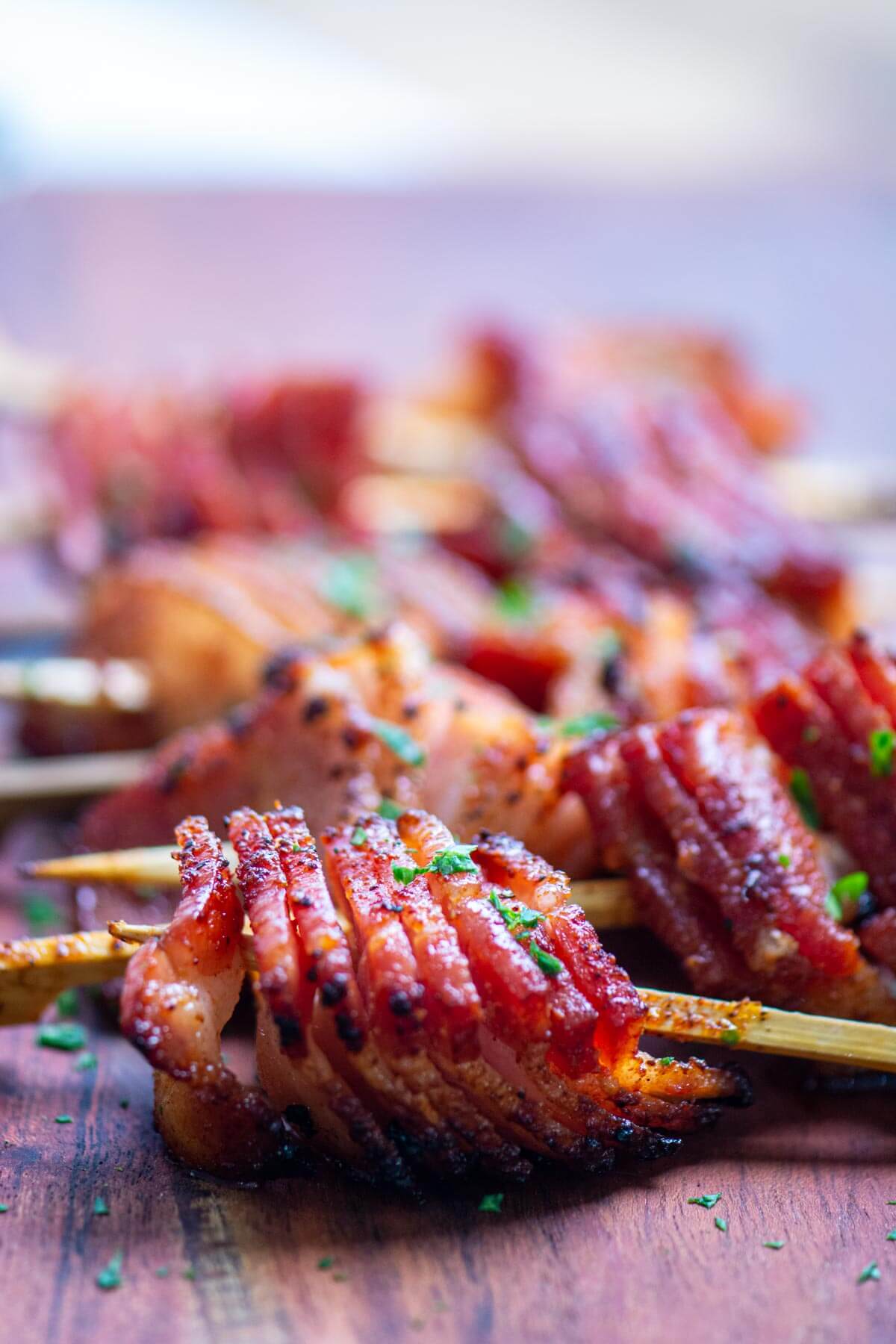
Are you trying to find some new recipes that will let you enjoy bacon? Me and my family are huge fans of bacon, so here are some of our favorites:
- Grilled Bacon On A Stick
- Grilled Twisted Bacon
- Grilled Chicken Livers Wrapped In Bacon
- Grilled Bacon-Wrapped Tater Tot Bombs
- Bacon Wrapped Smoked Pork Tenderloin
- Honey Mustard Glazed Bacon-Wrapped Chicken Bites
- Bacon Wrapped Grilled Bison Meatballs
- Grilled Bacon Brussels Sprouts Kebabs
- Asian Bacon Green Bean Bundles
- Air Fryer Bacon Wrapped Asparagus
- Bacon Wrapped Mushroom Kabobs
- Keto Chicken Bacon Ranch Casserole
🐖Pork Belly Recipe Ideas
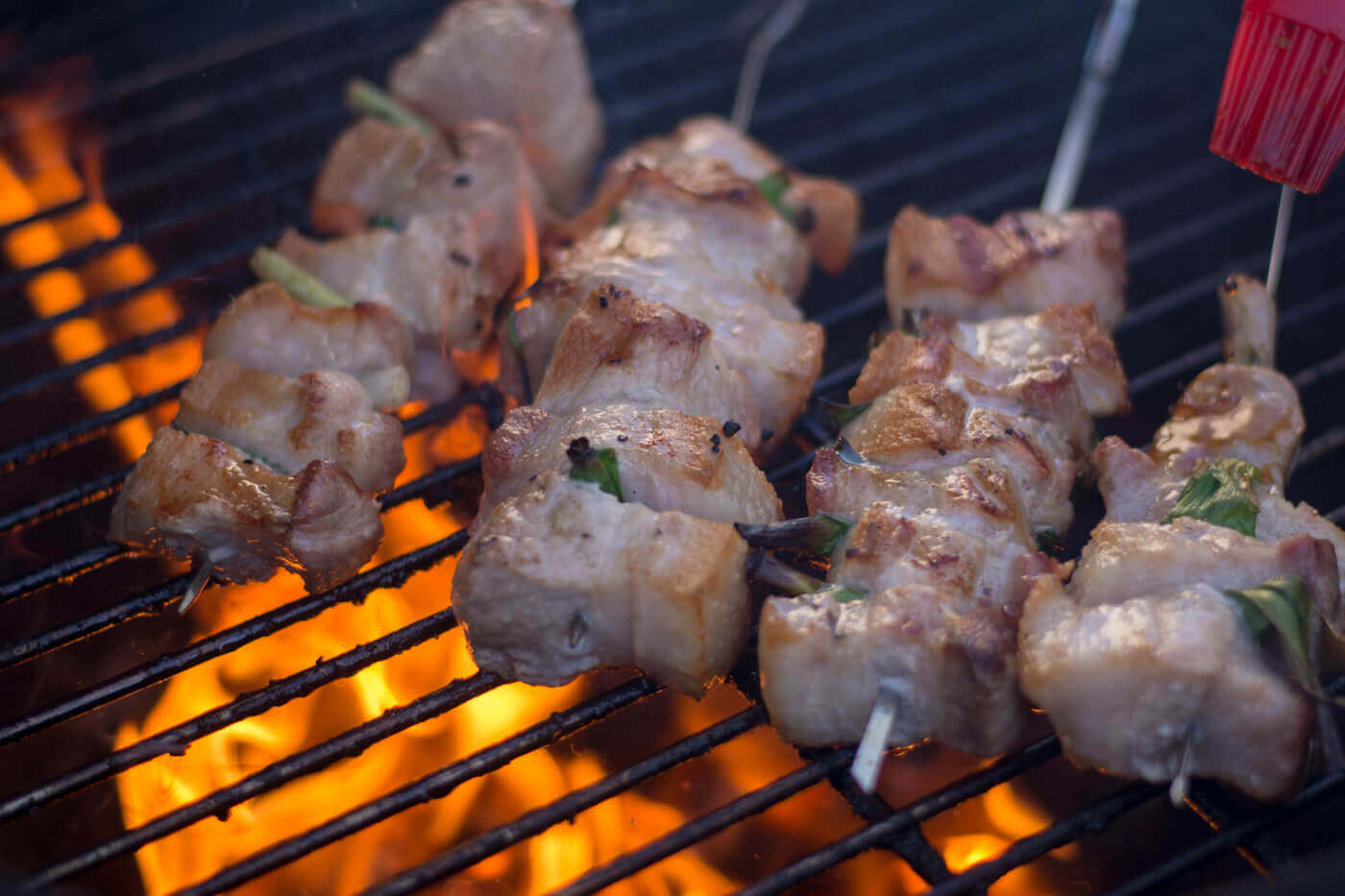
Pork belly has a special appeal, and it’s worth experimenting with it. If you want to enjoy it in various ways, here are some amazing pork belly recipes, you can try at home:
- Grilled Pork Belly Yakitori
- Sticky Chinese Pork Belly
- Crispy Golden Pork Belly
- Air Fryer Pork Belly
- Smoked Pork Belly
- Gua Bao Pork Belly Bao Buns
- Teriyaki Glazed Pork Belly
- Kimchi JJigae
❓FAQ
Most of the time, bacon is cured, meaning it’s preserved with salt and nitrates. The curing process takes time and eliminates some of the water raw meat contains.
Various kinds of bacon are enhanced with a mix of spices which adds up to their cost. There is some general concern regarding nitrates and other additives used to make bacon, so naturally, opting for uncured bacon is the safer option.
Pork belly is sold raw and uncured, which means you are the one responsible for adding flavors and it doesn’t contain any harmful additives.
It is a cut from the belly of the pig if referring to bacon in the US, UK and Italy. Irish and Canadian bacon will come from the loin area.
In the US, Italy, and the UK, it is made from pork belly that is cured with spices and preserved using salt and nitrates. Canadian bacon comes from the pork loin that is cured, smoked, and fully cooked.
Final Thoughts
Pork belly and bacon might not be the same and that doesn’t mean you can’t enjoy both.
With so many types of bacon being available, chances are you’ll never get bored with it!
Pork belly’s fatty consistency will add flavor to your dishes and when cooked properly, it gets a soft and tender texture that will simply melt in your mouth. Bon appétit!
Related Recipes

Jason’s been firing up the grill for over 30 years after graduating from the US Coast Guard Academy. His love of finely-grilled steak and chicken led him to buy his first Weber grill to put on his apartment patio in 1992. Each military move led to a new grill (a mixture of gas and charcoal) until he fell in love with the Big Green Egg in 2008. Since then, he has added another 4 grills to the collection. Yes, he has a problem. Jason loves smoking in the ceramic BGE with exotic woods including olive wood from Egypt and hard to find varieties such as sassafras and orange wood. Jason takes the term “foodie” to a whole new level, jumping at the chance to take food tours and cooking classes during foreign travels. These have provided inspiration to incorporate new ideas into recipes when he gets back home. He has been featured in Fox News, Parade, Yahoo News, Kansas City Living and more. After retiring from the military and moving to southwest Florida, he has focused grilling and smoking locally sourced meats and fish (read: he likes to catch his own fish!)
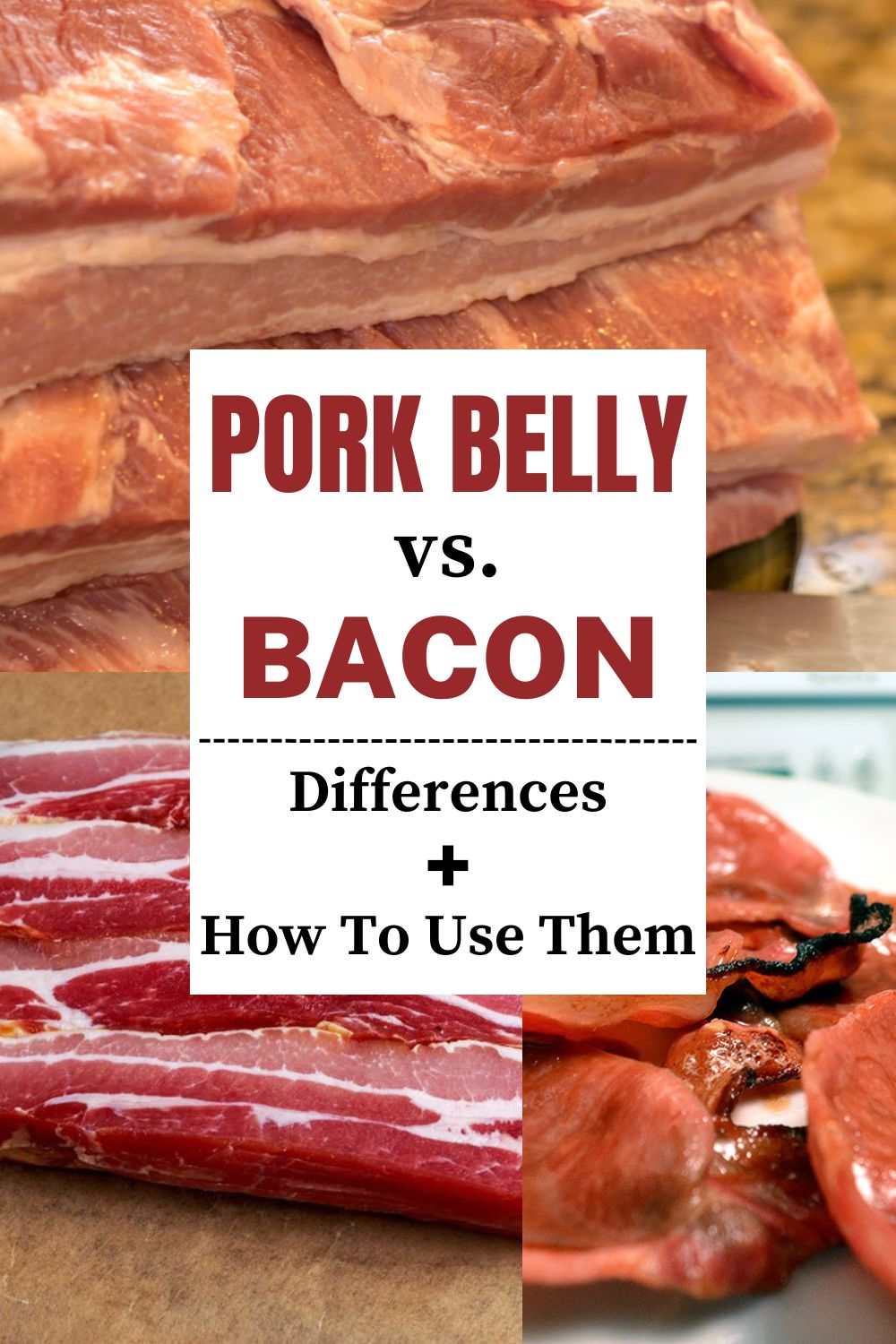
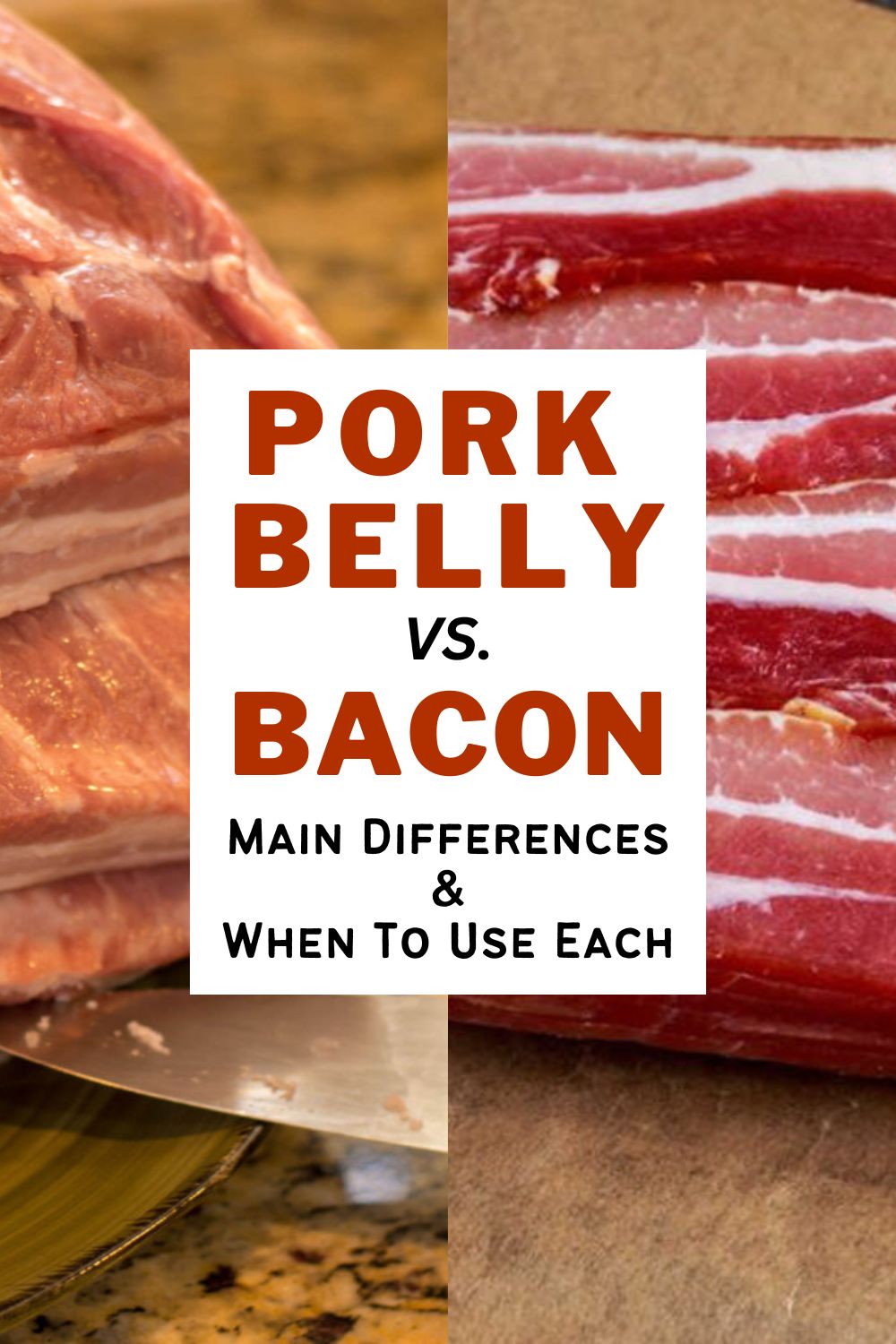







Leave a Reply